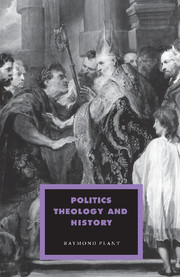Book contents
- Frontmatter
- Contents
- Preface
- 1 Liberal society and political theology
- PART I THE POSSIBILITY OF POLITICAL THEOLOGY
- 2 Theology and politics: context, community and prophecy
- 3 God, history and political theology
- 4 Totality, finitude and history
- 5 Narratives and foundations
- 6 Natural law and natural order
- PART II THE SITE OF POLITICAL THEOLOGY
- PART III LIBERALISM, RELIGION AND SOCIAL UNITY
- Select bibliography
- Index of names
- Index of subjects
- CAMBRIDGE STUDIES IN IDEOLOGY AND RELIGION
2 - Theology and politics: context, community and prophecy
Published online by Cambridge University Press: 23 November 2009
- Frontmatter
- Contents
- Preface
- 1 Liberal society and political theology
- PART I THE POSSIBILITY OF POLITICAL THEOLOGY
- 2 Theology and politics: context, community and prophecy
- 3 God, history and political theology
- 4 Totality, finitude and history
- 5 Narratives and foundations
- 6 Natural law and natural order
- PART II THE SITE OF POLITICAL THEOLOGY
- PART III LIBERALISM, RELIGION AND SOCIAL UNITY
- Select bibliography
- Index of names
- Index of subjects
- CAMBRIDGE STUDIES IN IDEOLOGY AND RELIGION
Summary
You only have I known of all the families of the earth: therefore I will punish you for all your iniquities.
(Amos)Then the Lord put forth his hand, and touched my mouth. And the Lord said unto me. Behold I have put my words into thy mouth. See I have this day set thee over the nations and over the kingdoms, to root out and to pull down, and to destroy, and to throw down, to build and to plant.
(Jeremiah)The aim of this part as a whole is to explore the possibility of political theology, and in this chapter I shall focus on the nature, role and purpose of prophecy in the Judaeo-Christian tradition.
There are three reasons for doing this. The first is that the prophetic role has been invoked in recent years, for example by the authors of Faith in the City, as a basis for the argument that the church has a legitimate prophetic role in relation to modern society and politics. The prophets of the Old Testament were involved in judging, admonishing and cursing those who held political power in Israel and other nations surrounding it, and so, it might be argued, there is nothing at all unscriptural in the modern church adopting a critical attitude towards the policies and principles which underpin modern politics. In addition, those who have advocated the development of an explicitly political theology have also appealed to the prophetic tradition to provide legitimacy for this endeavour.
- Type
- Chapter
- Information
- Politics, Theology and History , pp. 25 - 43Publisher: Cambridge University PressPrint publication year: 2001



